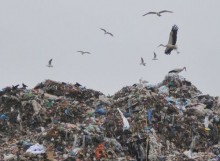The Day paid great deal of attention to storks, which have gone through lots of stress due to prolonged winter this year. People have helped to save the birds from starvation (see, for example, the article “Storks are rescued from hunger and stray dogs in Bukovyna” from March 28). Lviv region is not an exception. Local mass media even made a list of places with the greatest concentrations of birds. The list includes the water-purifying facilities of “Lvivvodokanal,” landfills in Zhydachiv and the village of Bronytsia, Drohobych raion, ponds in the villages of Volytsia, Pobuzhany, Pidstavky, Kutkir, and Poltva in Busk raion, etc. The Day’s photo reporter Pavlo Palamarchuk took a photo of storks in Hrybovytske landfill near Lviv in early April.
“This is fine, because now storks are coming back to their breeding territory after wintering in Africa,” said ornithologist Andrii Bokotei. “Birds fly a very long distance, some of them fly for over 10,000 kilometers and they made the trip in two months. That is why they often take a break on their way home to revive energy and rest their muscles. And, if they get a chance, they try to find some food. This year when they came we still had high snow and the birds couldn’t find any food. A large group of storks stayed at water-purifying facilities in the area of Kryvchytsi. People fed them a little bit – we advised warm-hearted individuals and organizations that fed the birds. What concerns the landfills, this is a food resource where many birds find food, especially during winter time. I don’t know of any cases when birds got poisoned in landfills… Once it is warmer, the storks will leave the landfills because there are no constructions suitable for building nests. Their basic instinct, like in any other bird, is the nesting instinct. Storks are very closely tied to the places where they were born. In science, there is a notion of imprinting, which means tying, remembering. For example, if a bird was born in a tree, it will always build a nest in a tree. The one that was born in a nest on an electric pole, will build his own nest on an electric pole in the future. Thus, don’t worry, they will all return to the places where they were born.”







